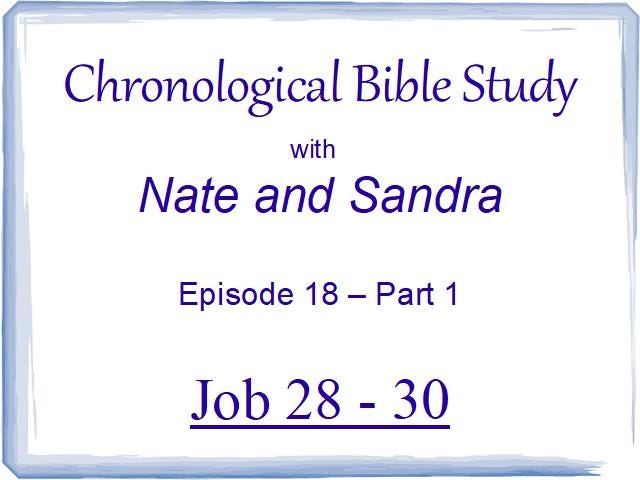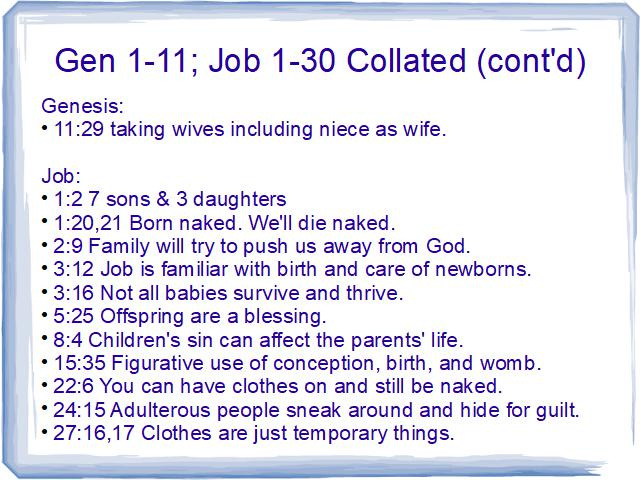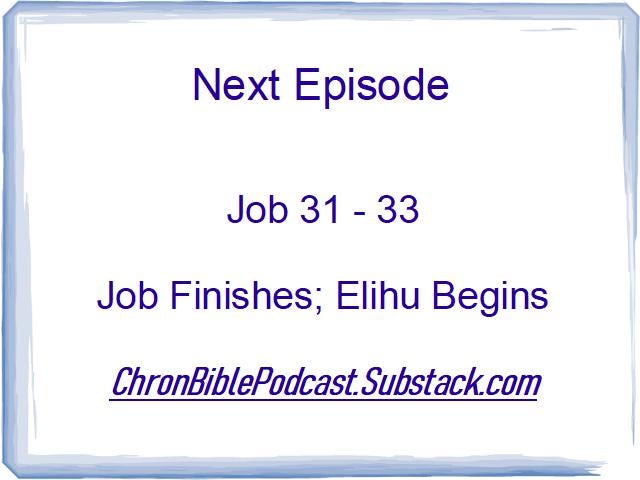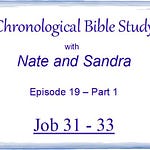If this is your first time joining us, the process I'm following in this technical study is fairly straightforward.
First, I expect you to read the chapters we'll be going over and making your own notes and analysis.
In just a moment, I'll summarize the reading one chapter at a time.
Next, I'll highlight some important verses in each chapter, especially those that apply to our chosen topic of sex and marriage.
I'll then compare the reading in different translations which will help bring out translational challenges and bring important words to our attention.
Then we'll get into a bit of a word study using Strong's and other references to dive deeper into the words and you see what they mean.
As needed, I'll have genealogy charts and maps to help make this a little easier.
Lastly, I'll come to some conclusions on each chapter and collate all these conclusions with our prior studies in order to bring all the verses on sex and marriage into focus.
As always, your feedback is appreciated.
Job 28 Summary
This is the third chapter of Job's discourse, seemingly in response to Bildad.
Verses 1-11 start by going into the rewards and perils of mining.
Verse 12, Job asks, Where is wisdom?
Verses 13-19, Job compares the price of wisdom to all those things pulled out of the ground.
Verse 20, Job asks again, Where is wisdom?
Verse 21-22, Death and destruction have heard rumors of wisdom.
Verse 23 to 27 Job declares God as wise. This is the main argument against Bildad's might makes right argument we looked at last time.
Verse 28 Fear of God is wisdom.
This will come up again and again throughout scriptures.
Highlights:
Verse 26b A way for the lightning of the thunder.
We recently learned that ion channels in the air trigger a small burst from ground to sky which then gives a path for the lightning to travel from sky to ground. I don't think Job had access to the super high-speed cameras that we use today to see this happening, but he understood it.
Verse 28 He said to man, Behold, the fear of the Lord, that is wisdom.
To turn away from evil is understanding.
Job 28 Alternate Translations and Word Study
Verse 12 is what I am looking at, but it is not because of translational differences as much as a word study.
Verse 12, But where shall wisdom be found?
Where is the place of understanding?
The word wisdom means wisdom in a good sense, and it comes from a primitive root which means to be wise in mind, word, or act.
This definition is of no help.
Often the way a word evolved into use gives us a lot of information about the way the concept was imagined or its usage.
Wisdom, however, must be understood from the way the Bible describes it,
rather than based on the origin of the word or its evolved definition.
Understanding, however, gives us a lot more information.
The word used for understanding is understanding, so it seems like it's the same useless definition as wisdom, but it comes from a primitive root which means to separate mentally to distinguish that is generally to understand
Here the definition we can understand to understand is to make distinguishments, separations, noticing the difference between a and b.
This is similar to that but different from other things.
Satan's plan to destroy man's understanding involves blending everything up until you can't make a dime's worth of difference between right versus wrong, sin versus righteousness, legal versus illegal, moral versus immoral, etc.
The common phrase is, it's all a matter of perspective.
There's truth there, but the way it's used is 99% lies.
Verse 17 “The gold and the crystal cannot equal it, or the gold and glass cannot equal it.”
The word in question is crystal, which comes from the word that means transparency, like glass.
With all the emphasis in this discussion on mined minerals, why would the translators jump to a manufactured substance that has never been used as money, such as glass?
Why not use a different transparent mineral like quartz or diamonds?
Job 28 Conclusions
Job uses mining as an example of people going to great effort and risk to get things we think are valuable. Wisdom is more valuable than all of it. We can find the place where gold and gems are stored underground, but wisdom is not stored up in a physical sense. Once found, nor can we pile wisdom up or exchange it for stuff.
Fear of the Lord is wisdom.
Departing from evil shows understanding.
Using the word study we just did, we need to treat these two parts of the verse differently.
Understanding means to differentiate mentally, so departing from evil is to separate yourself from evil.
But it first requires the ability to mentally separate what is evil from what is good.
To define wisdom, we need to understand the fear of the Lord.
We looked at this fear before. It means moral reverence.
Some like to talk about the union or division between the sacred and the secular.
The sacred is the ideal, the highest pinnacle that we should strive to reach.
The union of the sacred and the secular is to realize that there is nothing secular. There is not a place in our lives where God's word and our emulation of God does not reach.
It's not like we're reaching for God in this building, but not reaching for God in that building. Either we're reaching for God in every aspect of our lives, or we're not reaching for God at all.
The division of the secular and the sacred is to recognize that some things distract us from our reaching for God. Anything that undermines your focus on God and our emulation of him is secular, a distraction, and thus evil.
You cannot simultaneously choose to climb the mountain while also choosing to stay in the valley. It's a mutually exclusive choice since you cannot be in two places at the same time.
Job 29 Summary
First, Job continues by describing his life before this calamity and testing started.
Verses 2-5, Job talks about his cultural relationship with God.
Verse 6, Job describes his wealth and comfort.
Verse 7-11, Job describes the respect he had among all people, even other rich and powerful.
Verse 12-17, Job describes all the good things he did to the weak and poor.
Verse 18-20, Job talks about his bright future that he thought he was going to have.
Verse 21-25, Job goes back to talking more about the people and how they interacted with him.
Highlights
Verse 14 “I was clad with justice and I clothed myself with judgment as a robe and a diadem.”
There are no significant translational differences.
Oddly, there are no new or important words in this chapter that we haven't already studied
Job 29 Conclusions
Job recounts the way his life used to be.
He had a close relationship with God.
He was wealthy and comfortable.
He was respected.
He helped others.
He was hopeful and thought it would never end.
I think the big deal in all this is how much emphasis Job places on his relationship with people. In some sense, it can be good because he values others, but I wonder if he crossed the line in all this and was lifted up in pride seeking the praise and respect of others rather than simply being content in the praise and respect of God alone.
This would also explain why Job is taking this whole argument with his friends as hard as he is. He is not used to people arguing or pushing back on his opinion.
In verse 21, "Men listened to me and waited and kept silence for my counsel."
It's rough for someone who is used to being surrounded by yes-men and sycophants to deal with disagreement. His friends may have been part of this description of those who stopped talking when he came around and considered themselves blessed by his mere presence and doubly blessed by whatever he said.
Before all this calamity happened, he could do no wrong.
Chapter 30 Summary
Verse one starts with the telling "But now..."
This chapter is the contrast of chapter 29. That was then. This is now. My how things have changed.
Verses 1-14: Forget princes and friends, even animalistic fools don't respect Job any more.
verses 15-17 Instead of hope and joy, he's filled with fear
verse 18-23 Job feels like God has abandoned him
verse 24-26 He helped others, but when he cries out for help he's ignored.
Twice in this chapter, he uses the phrase "Days of Affliction".
Verses 27-29 is the second use as it's how he's seeing his current situation
Highlights:
vs 18 "With great force my garment is disfigured. It binds me about like the collar of my tunic."
Either he's feeling like someone has grabbed him by his clothes from behind and is choking him with it, or he's feeling like this situation is strangling him like his clothes can do when they get twisted and pulled wrongly.
vs 20 “I cry to you for help, but you do not answer me. I stand, and you only look at me.”
I was thinking that the "you" initially were referring to God, but, while there are places here where Job is crying out to God, I think this is referencing to his friends instead. He keeps asking them to help his pain or for direction out of the affliction but none of them are doing anything to help. Their answers are unhelpful.
verse 22a "You lift me up on the wind. You make me ride on it."
This is where we get the phrase, "Ride the Wind".
It's like a flag that's been whipped about in the wind and exposed to all the weather: pouring rain and baking sun and never given any protection from anything. Even the best flags wear out in those conditions and need to be replaced.
There are no significant translational differences.
Oddly, there are no new or important words in this chapter that we haven't already studied.
Job 30 Conclusions
Job draws contrast with the way animalistic people hold him in contempt. His cries of sufferings are ignored. He asks for help but people just look at him.
He lives alone, isolated from others.
He is afraid and feeling helpless.
It is important to note that amid all these feelings of fear and the change in his situation Job isn't lashing out physically or doing anything rash.
We've said this before.
He's analyzing the situation and trying to get answers, but he's not losing his mind and living like the animalistic people who see him as less than themselves.
Job's not doing all the evil he knows he shouldn't do.
He's waiting on God to see and act.
For the complete list of verses on sex and marriage that we've gotten thus far, go to Substack's support page where you can see all the charts, maps, and the complete list of verses related to sex and marriage that will grow as we glean more from God's Word.
That's chronbiblepodcast.substack.com
There are no new verses to add to our collated list of verses on sex and marriage from this week.
In the next episode, Sandra and I will discuss these chapters in a more personal, interactive way.
Next week, we'll look at Job 31-33.
Job finishes his speech, and Elihu steps up and starts speaking.
Enjoy.















Share this post